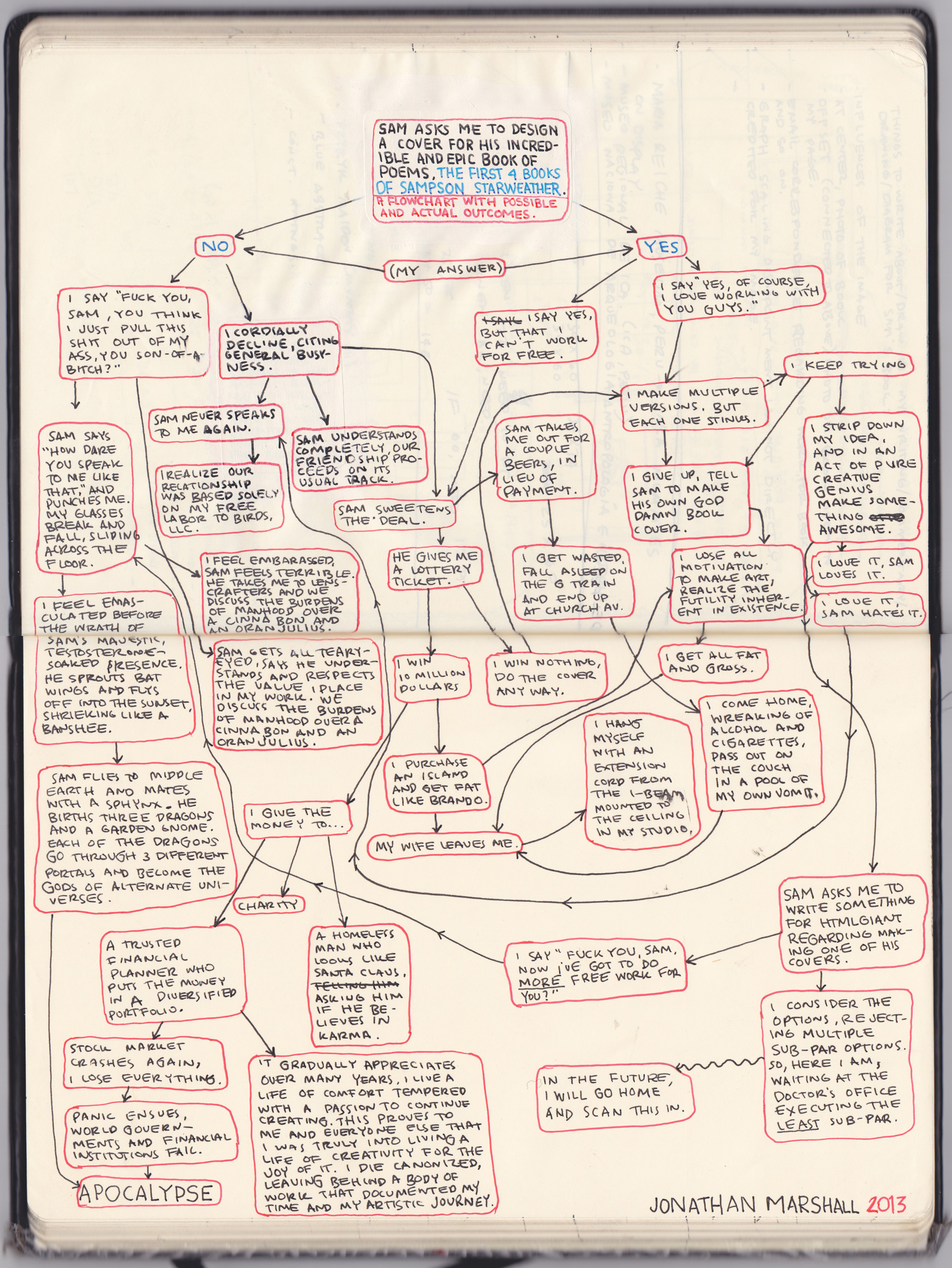The Beginner’s Guide to Hegel

Jesse Hudson, one of the most monastic and scholarly people I know, started talking about Hegel on Facebook. Hegel’s work has always felt intimidating to me, and often when I read his writing, I think that he’s totally full of shit—that he took simple, intuitive ideas and hyperinflated their elucidation to appear logically rigorous and philosophically masterful. Basically, I got thinking that Hegel was a damned charlatan.
But I also knew that Jesse deeply responded to Hegel’s philosophy. So I asked him some questions for the Hegel-averse and uninitiated, following the format of The Beginner’s Guide to Deleuze with Christopher Higgs. Here we go:
Why should we read Hegel?
Hegel is fucking difficult, right?
In order to proclaim the importance of reading Hegel, the initial hurdle to overcome is the impression one initially has in regards to the supposed difficulty (or, stated more extremely, incomprehensibility) of Hegel’s texts. This isn’t necessarily a misinformed opinion of Hegel since, without doubt, Hegel’s texts are extraordinarily rigorous and densely packed. It isn’t uncommon to spend hours (or hours and hours over the span of several days) unpacking a mere page or two of his Phenomenology or Logic. This is due, in large part, to the fact that Hegel (like, it must be admitted, any other philosopher) writes with his own peculiar terminology. Derrida has differance; Deleuze has rhizome; Hegel has being-for-self, negation of the negation, positing presuppositions, ‘sublation’, being-in-and-for-self, etc. Hence, reading Hegel involves a great deal of work that is not unlike the work involved in learning a new language. But, to paraphrase Derrida, you wouldn’t necessarily decry the difficulty of a thermonuclear physics text or a text discussing the subtleties of semiotics and differential calculus. Therefore, the cries of anger and frustration seem a bit odd when directed towards philosophy (texts that are undoubtedly as theoretical and ‘specialized’ as the previous examples). READ MORE >
STARK WEEK EPISODE #10: “So of course I said yesh of courth” — Sommer Browning on the cover of SELF HELP POEMS
For our last cover artist divulgence of STARK WEEK, here at mighty mighty Episode Ten, we have the top-of-the-mountain comic drawer and comic speaker and deep poet Sommer Browning to share with us her process for the cover of Self Help Poems and her ideas on what exactly will help us all.
 I was honored (drinking) when Sampson asked me to draw the cover for Self Help Poems, so of course I said yesh of courth. After reading the manuscript, I could see why he asked me to draw this particular cover. The poems pull innocence and nostalgia through the streets of pop culture and childhood—and I think I draw like that. He offered me a few wonderful ideas and I pulled together the ones I loved. One of the ideas was the classic self help book cover, so I researched (Googled) what those look like.
I was honored (drinking) when Sampson asked me to draw the cover for Self Help Poems, so of course I said yesh of courth. After reading the manuscript, I could see why he asked me to draw this particular cover. The poems pull innocence and nostalgia through the streets of pop culture and childhood—and I think I draw like that. He offered me a few wonderful ideas and I pulled together the ones I loved. One of the ideas was the classic self help book cover, so I researched (Googled) what those look like.
I used to work at Waldenbooks (a store that sold textual materials) and the self help section was my favorite (more favorites: Four Loco and images of nuclear reactors). The life-affirming promises on the covers of these books are self-satisfied propaganda at the expense of the self-centered (woman-moms, man-dads, etc.). To me, putting these kinds of promises on the cover of a book of poems was hilarious (Mr. Bean when you are seven years old) and true (Bible)—and I thought it created an interesting juxtaposition (Ice-T & Coco).
Sam also gave me a photograph of himself dressed like Les Nessman in a neck brace waiting for a call from Brian Dennehy. Needless to say, this was pure inspiration. The “Over 7 Sold” sticker was a creative way to conceal a number of things. Pretty much my favorite part of this drawing was Dan Boehl’s suggestion that I add the “*Neck Brace Sold Separately” bit.
I was also in love with spelling the title of the book wrong. So I had a backup cover, a very lo-fi drawing of a fast food type cup with SELP HELF written on it.
Sommer Browning is the author of Either Way I’m Celebrating (Birds, LLC; 2011), a collection of poems and comics, The Presidents (And Other Jokes) (Future Tense Books, 2013), and various chapbooks. With Julia Cohen she runs the Bad Shadow Affair, a reading series in Denver, and with Tony Mancus she founded Flying Guillotine Press, a small poetry chapbook press.
STARK WEEK INTERLUDE: SLampson at the Beast Forest
This is what happens when a poet quotes his poetry to a weird worm-looking thing in Second Life, a 3D world that announced a ban on in-world gambling on July 28, 2007, in fear that new regulations on Internet gambling would affect the privately held American Internet company if it was permitted to continue.
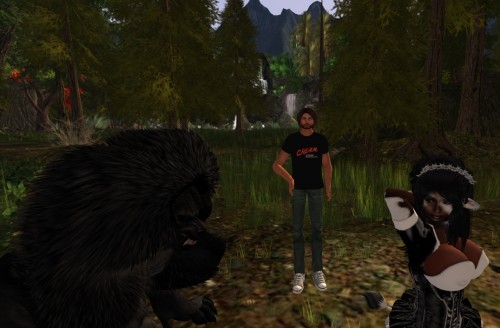
[21:11] Slampson Slarkweather: this forest is unusually horny.
[21:13] Namadisi: it is a romantic forest on the sky hahahhaha
[21:13] Namadisi: :)
[21:15] Slampson Slarkweather: They sky has no clouds here. Just a ridiculous blue.
[21:16] Namadisi: maybe is your viewer?
[21:16] Namadisi: i see clothes
[21:19] Namadisi: lol
[21:19] Namadisi: clouds
[21:20] Namadisi: hahahahhhahaa
[21:22] Namadisi: and clothes or course
[21:23] Slampson Slarkweather: Anyone who dances with their shirt on is dead to me.
[21:23] Namadisi: hahahahahahahahaa
[21:24] Namadisi: we ae near the lake who wear shirt near a lake???
[21:26] Slampson Slarkweather: Fracking laws and loopholes taught us water is winning.
[21:27] Namadisi: hhahahahaha the water does look nice
[21:27] Namadisi: you should go take a dip
[20:28] Slampson Slarkweather: You should really come see what it’s like down here, to be me.
[20:30] Namadisi: where r you?
[20:33] Namadisi: hahahhaa now i know what you mean hahahahhaa
[21:35] Slampson Slarkweather: I want to go home, find you have been living beneath my bed, take off all our clothes, lie back and talk and talk until it’s ruined the stars.
[21:38] Namadisi: wow
[21:38] Namadisi: nice words poet?
[21:38] Slampson Slarkweather: i’m not a poet i just crush a lot.
[21:39] Namadisi: hahhaha
[21:39] Namadisi: you fo that well
[21:40] Slampson Slarkweather: My friend thinks poetry has nothing to do with words.
[21:42] Namadisi: well thats silly poetry has eferything to do with words
[21:02] Namadisi: :=))
[21:42] Slampson Slarkweather: Poetry is exactly like sexual harassment. Don’t ask.
[21:43] Namadisi: no i think i understand =P
[21:44] Slampson Slarkweather: Your exercises in empathy are encouraging, but is it really possible for two people to ever understand each other?
[21:45] Namadisi: hmmmmm good question
[21:45] Namadisi: i think so
[21:46] Namadisi: if you get 2 kno someone well enough and spend alott of time listening to each other then yea
[21:47] Namadisi: thats true love =D
[21:49] Slampson Slarkweather: I have love like a headache.
[21:49] Slampson Slarkweather: Sure you can cut a hole in a sheet but good luck trying to fuck a ghost.
[21:51] Namadisi: O-o what do u mean
[21:51] Slampson Slarkweather: Hello plasma. It’s me, fellow fake state of matter.
[21:54] Namadisi: is this a joke or somethin’
[21:55] Slampson Slarkweather: the secret to life is being tan.
[21:56] Slampson Slarkweather: Give me your wallet.
[21:56] Slampson Slarkweather: Did you think this poem was going to end by itself?
[Note: This dumb thing was inspired by this broadside from Rye House Press.]
STARK WEEK EPISODE #9: “Help and Hope in Sampson Starkweather’s Self Help Poems” — Amy Lawless on the last book of TFFBOSS
Sniffingly we are nearing the end of STARK WEEK, as we round the corner into the last book, Self Help Poems, with the fantastic Amy Lawless onboard to epically investigate. Don’t put your boots away yet because there is more to come, including prophecy, art talk, videos, and contests!
 I have asked myself many times why actor Mickey Rourke is so appealing and attractive to me. Over time he has aged, yet he still manages to allow us, the consumers, access to another human place and plane. Sampson Starkweather doesn’t use the words “appealing” or “attractive,” but he writes on how Rourke’s “therapist told him he was in a hopeless situation, but he still had hope. All humans aspire to the condition of Mickey Rourke” (255). Here on the ninth page of Self Help Poems in The First Four Books of Sampson Starkweather, hope emerges, which makes sense because man is a social animal—we are each other’s only chance of salvation.
I have asked myself many times why actor Mickey Rourke is so appealing and attractive to me. Over time he has aged, yet he still manages to allow us, the consumers, access to another human place and plane. Sampson Starkweather doesn’t use the words “appealing” or “attractive,” but he writes on how Rourke’s “therapist told him he was in a hopeless situation, but he still had hope. All humans aspire to the condition of Mickey Rourke” (255). Here on the ninth page of Self Help Poems in The First Four Books of Sampson Starkweather, hope emerges, which makes sense because man is a social animal—we are each other’s only chance of salvation.
Mickey Rourke is not tricky; he is wise—body-wise. In the film The Wrestler, viewers followed him into an oblivion, a place we all go (some of us more quickly than others). Some of us are tiptoeing as slowly as possible toward death with our many fish oil supplements, mountain poses, punitive juice cleanses, hand sanitizers, Deepak Chopra books, or prayers. Some of us are in a speeding car wearing no sunscreen, driving as far away from prostate checks as possible, pumping the speedometer far right with a recklessness our mothers should never know exists. We are each Mickey Rourke jumping off the rope toward our own single finality. READ MORE >
July 19th, 2013 / 4:06 pm
Great Here
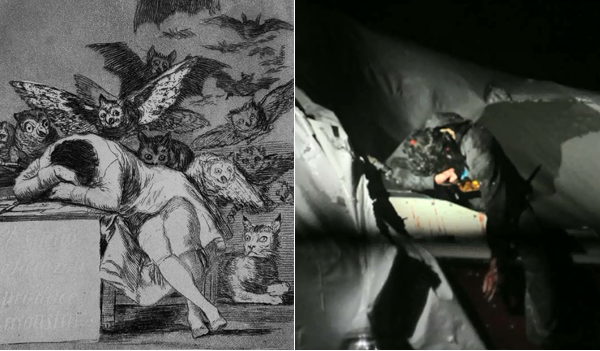
In reaction to Dzhokhar Tsarnaev beautifully gracing the cover of Rolling Stone, with great hair the less-disheveled would pay for, a Massachusetts State Police officer released photos of “the real Boston bomber,” as a kind of ultimate #nofilter, featuring one of the boy painfully climbing out of the boat he was hiding in. A sniper’s rifle laser falls short of the Hindu third-eye, but we’ll take that red dot as a kind of more precise Western spirituality. Francisco Goya’s “The Sleep of Reason Produces Monsters” (c. 1798) is probably the most iconic of Los Caprichos, a set of 80 satirical etchings condemning Spanish society for its superstitious pedagogy and foolish ruling class. “The author is dreaming,” he remarks of the print. “His only intention is to banish harmful superstition and to perpetuate with this work of fancy the sound testimony of Truth.” Little did he know that we, as idle linguists with something to grind, would chew on such Truth like termites over the course of a ruined home. The author ducks from his very thoughts, portrayed by flocking owls, only to be banished within the very consciousness from which such birds are cracked. It’s not great here, the mind. In 1970, Charles Manson was featured on the cover the Rolling Stone — with likewise great hair, which may also invoke Jimi Hendrix, Britney Spears, George Harrison, Kurt Cobain, Justin Bieber, Johnny Depp, Amy Winehouse, Madonna, et al., etc., ad infin. Short of reducing such talented people to their hair, we might consider whose demand the magazine is supplicating. As part of the American dream i.e. code for commerce, appalled dissenters are free to not buy a copy, and stores — in timid solidarity with its ruling class, the consumers — may boycott that issue, or the magazine in general. My guess is they’ll be fine. Two wrongs don’t make a right, but a market return. In our grand national narcolepsy, may we have a lucid dream in which we wake, one so lifelike and real — with bells and whistles, traffic jams and hail, love and murder — that it seems, with insane conviction chaperoned by invented beasts, that we are awake.
STARK WEEK EPISODE #8: “SAM FLIES TO MIDDLE EARTH AND MATES WITH A SPHNIX” — Jonathan Marshall on the cover of THE WATERS
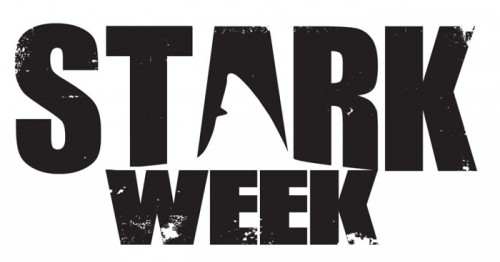
For Episode Great Eight of STAAAAAAAAAAAAAAAAAAAAAAAHK WEEK, we welcome artist and witty flowchartist extraordinaire Jonathan Marhsall to map the process of developing the cover of The Waters, book 3 of The First Four Books of Sampson Starkweather. More multimedia and interaction coming soon! Including contests to win a copy of this bad boy for yourself!
CLICK THE IMAGE TO SEE IT FULL SIZED

Jonathan Marshall is a visual artist living in New York City, originally from Austin, TX.
He is currently holed up in his studio, preparing for a solo exhibition at Grimm Gallery in Amsterdam, NL, which will open in October of 2013. http://www.jonathanmarshall.
July 19th, 2013 / 12:31 pm
WOLF & PILOT by Farrah Field
 Wolf and Pilot
Wolf and Pilot
by Farrah Field
Four Way Books, Oct. 2012
72 pages / $15.95 Buy from Four Way Books or Amazon
The art museum in my hometown of Knoxville has a collection of Narcissa Thorne dioramas, miniature rooms of various fashion and purpose, similar to doll houses. There is a Victorian parlor, a Spanish foyer, a frontier kitchen, all meticulously detailed and like the collection room itself, mostly devoid of people. Each illuminated box presents a stage where any number of actions can take place. The rooms rely on the many arrangements of our imagination—who sat in the armchair, who leaned on the mantelpiece—all the possible scenarios laid out and invisible like precious crime scenes. Yet despite the dramatic combinations an empty stage can offer it’s still bound by purpose: the kitchen is where you cook, the bedroom is where you sleep, and the armchair is where you left it. In the opening poem of Wolf and Pilot—not coincidently inspired by one of Thorne’s rooms—Farrah Field writes:
could walk in on a daily basis, mount a war-period wall clock,
pollute the cold kitchen with pork dumplings, heat the toilet seat.
The poems in Field’s second collection both accept and challenge this mystery. They investigate the nature of absence, the human need to satiate a vacuum, and the gnarled process of memory and apprehension. Centered around four missing sisters, their witch-mother, their beloved teacher and the detective enlisted to find them, Wolf and Pilot is a novella-in-verse which defies its own narrative boundaries.
Echoing Pirandello’s Six Characters, the speakers in Field’s poems are inextricable from the theater of their lives. As per the demands of the story they follow a certain direction, confined to prescribed roles (“What are you supposed to do besides what you have to?”), but this doesn’t stop them from confronting—sometimes bravely, sometimes with caution—their psychological limitations (“We’ll never say this: we want to hang/a sheet from a tree and project movies”). There are moments when the characters are brimming with awareness, their ambitions and failures on display. “You think I’d know what to do,” the detective says, “because I agreed to take care of them.”
July 19th, 2013 / 11:00 am
U.K. Author Spotlight (1) – Gary J Shipley
Realizing that they speak and read English in the U.K. and that they write in it too (and because I’m originally from South Africa a kind of diamond and veldt version of the U.K. with much better weather and beaches), I’ve decided to start a new feature that follows kind of in the vein of the Seattle Author Spotlight series. So, periodically, now, I will be featuring a U.K. author.
And the first UK Author Spotlight’s of Gary J Shipley. Gary and I recently became email and Facebook “chums” (see how easy this is?) and then he did a nice write-up on my new book and I blurbed his forthcoming book of poetry. Gary and I swap quite a lot of emails and Facebook “Likes” (these, hint-hint, make me feel really, really great.)
Gary’s smarter than me, much more philosophical and is able to write a Godless sort of language and landscape that I envy tremendously. When I saw the movie Pina I thought about Gary’s poetry. Gary is also an Artist. Kind of like Michaux. But different. I look very much to one day meeting Gary in person.
Also, fyi, this is what Brian Evenson has to say about Gary’s “Dreams of Amputation“:
Dreams of Amputation reads like the nightmares Derek Raymond might have experienced if he’d written cyberpunk. An exceptionally strange work, but a smart and thoughtful one as well. Disturbing, haunting, and inimitably weird, this is a book like no other.
So, anyways, Gary J Shipley’s Author Spotlight consists of a brief interview, Bio photo and Art.
Brief Bio:
Gary J Shipley is the author of eight books of various sizes. His latest is forthcoming from Blue Square Press. He has published in Gargoyle, The Black Herald, Paragraphiti, elimae, >kill author, nthposition, 3:AM, and others. More details can be found at Thek Prosthetics.
Brief Interview:
Rauan: Does the British Bulldog have any teeth left? (ie, can you tell us a bit about the state of British Literature, fiction, poetry, whatever)
Gary J: Yes. It has a single brown stump that bends when it bites you. READ MORE >
WAKEFIELD PRESS REVIEW: Introduction & TREATISE ON ELEGANT LIVING
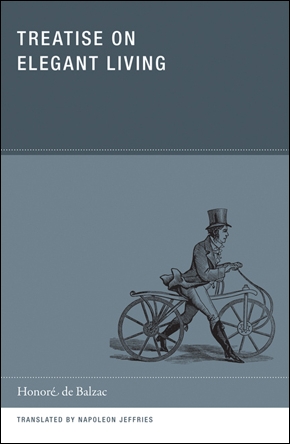 Treatise on Elegant Living
Treatise on Elegant Living
by Honoré de Balzac, Translated by Napoleon Jeffries
Wakefield Press, March 2010
112 pp. / $12.95 Buy from Wakefield Press
Wakefield Press describes themselves, on their website, as “an independent American publisher devoted to the translation of overlooked gems and literary oddities in small, affordable, yet elegant paperback editions.” The fact that they are a publisher dedicated specifically to translated “buried” texts, so to speak, has kept them on my horizon since their launch in 2010. As the press has developed, they’ve continued to release incredibly interesting (and, as is their goal, elegant) books by many authors and writers that populate the literary landscape that I prefer to frequent. Paul Scheerbart, who I learned of as a devotée to “glass architecture” in my readings on the architecture of the fantastique, has had two books released by the press, many (often absent) key players of French literature have books on the press (Marcel Schwob, Georges Perec & Rene Daumal to name a few), and even the authors I hadn’t formerly heard of seem tailored to my taste. As such, I thought it would be a brilliantly rewarding project to review every title the press has released.
Earlier in the year I reviewed their release of Rene Daumal’s Pataphysical Essays, and my enjoyment of everything about the book (from its content to its translation to the materiality of the book itself) lead me to consider the project. I had encountered the concept of reviewing an entire press’s output before, I think initially in JA Tyler’s review of Calamari Press’s output on BigOther. While I love Calamari press, their output spans, at this point, much wider than Wakefield Press, whose number of titles seemed both manageable and limited enough that I would enjoy the entire project. I had no interest in launching into the project & losing steam half-way through, as I knew that would be disappointing both on a personal level, and also probably a disappointment to the press. With these considerations in mind, I decided to dive in.
As I am a fan of chronology, I’ve decided to approach the Press’s released chronologically. This would serve to give structure to the project, and also provide me with a path through the meta-textual elements of the press itself, as they grew from a press having only published two books (their launch), into having published 10 books at this point, with more titles on the horizon. So without further adieu, I’d like to present the launch title of Wakefield Press (while I think it was released in tangent with Pierre Louys’s The Young Girl’s Handbook of Good Manners for Use in Educational Establishments, Treatise… is granted number “1” in the press’s subdivision of “Wakefield Handbooks”).
July 18th, 2013 / 4:52 pm



